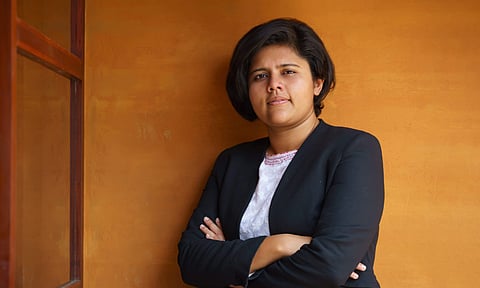

Architecture is not just about huge buildings and fancy interiors. It is all about creating spaces for oneself without causing harm to our surroundings, says Sridevi Changali, Co-founder of Masons Ink, an architecture and design firm based in Bengaluru. Started in 2013 by Sridevi and her friend Rosie Paul, this start-up mainly focuses on the conservation of heritage buildings, old farmhouses and NGOs. Sridevi recalls, "Rosie and I met at college during our graduation and we realised that our idea of architecture and sustainability correlate. Later, our career path also went in the same direction. We both went on to work with Auroville Design Consultants in Puducherry where we learnt most of our basic skills, using natural materials for the construction of buildings, creating simple yet beautiful designs and much more."
While Rosie is into using mud for the construction of buildings, Sridevi is more into heritage conservation. When the duo was working with Auroville, Sridevi realised that her interest lies in working on heritage buildings and she further worked with the Puducherry chapter of INTACH. Sridevi says, "Indian National Trust for Art and Cultural Heritage, as the name suggests, has been working for the restoration of heritage buildings across India since 1984. The organisation has a more holistic approach towards conservation because they don't simply draw lines to make designs but work closely with masons and workers who execute most of our plans. After working with INTACH, I pursued my Master's in Earth Architecture from CRAterre in France. And this start-up happened to us. At the same time, Rosie was working with an NGO that focused on the practices of rural housing and one of them was using bricks made of mud to build homes. We loved the idea so we started using these mud bricks in almost every project."
The duo soon bagged their first project — to design a house with eco-friendly features in Madurai. Sridevi believes that as an organisation, their goal is not only to fulfil the needs of their clients but educate them about some of the sustainable practices they follow without any compromise. "Whenever we told our clients about using mud, they would be surprised and immediately question us about it — 'Will it not melt when it rains?' 'Can the buildings sustain for a long time?'. Usually, people have a wrong perspective of mud buildings. They think of old cracked walls and broken ceilings but it not so. Hence, educating as well as convincing them to use mud is quite challenging for us," says Sridevi. So how do they convince them? "We tell them about all the research happening in other countries. For instance, in Germany, the architects and the soil experts are researching the concept of 3D prints of mud buildings. Another added advantage of using mud is that we don't import materials. The main idea behind constructing healthy new buildings is to use the local material available around us in that particular site. We need not use mud bricks in all the sites and projects. In one of our projects, we used huge stone slabs that were lying around the house to build a small room. Similarly, in one of the organic farmhouse projects, we turned quarries into percolation pits. When we work on a particular project, we see that the buildings we design are climate responsive and less impactful on the environment."
Over the past seven years, the duo has worked on 40 projects, including the construction of new and healthy buildings as well as conservation of older buildings. But what makes them unique is the importance they give to their masons and workers on the field. Sridevi believes that they are the real talent behind the architecture marvels of the world. For this, the duo conducts workshops and various activities for architecture students and other people who are interested in learning something new. She says, "While it is important to construct new buildings or preserve old ones, it is even more important to educate the future generations as they play an important role in taking these practices further. We host workshops at the construction sites and tell students, in detail, what actually happens on the site. Not just us, even the masons take them around to teach them the methods of building a wall or placing bricks and so on. Aside from this, we allow them to build something small that will continue to be part of our project."
Like any other organisation, even Rosie and Sridevi have seen their fair share of ups and downs. When the lockdown was announced, the first thing that the duo did was connect with masons, contractors and workers to find out how they have been managing without work and income. "We would call them constantly to check on their needs and requirements. Besides this, it was a lot of learning and unlearning for us as an organisation. We dug deeper to understand how the market will function in the future and what we need to put in place to make things work when it comes to design and architecture. Apart from this, we conducted online workshops and webinars for beginners to learn the skills of using different software and designs when it comes to eco-friendly practices," she concludes.
